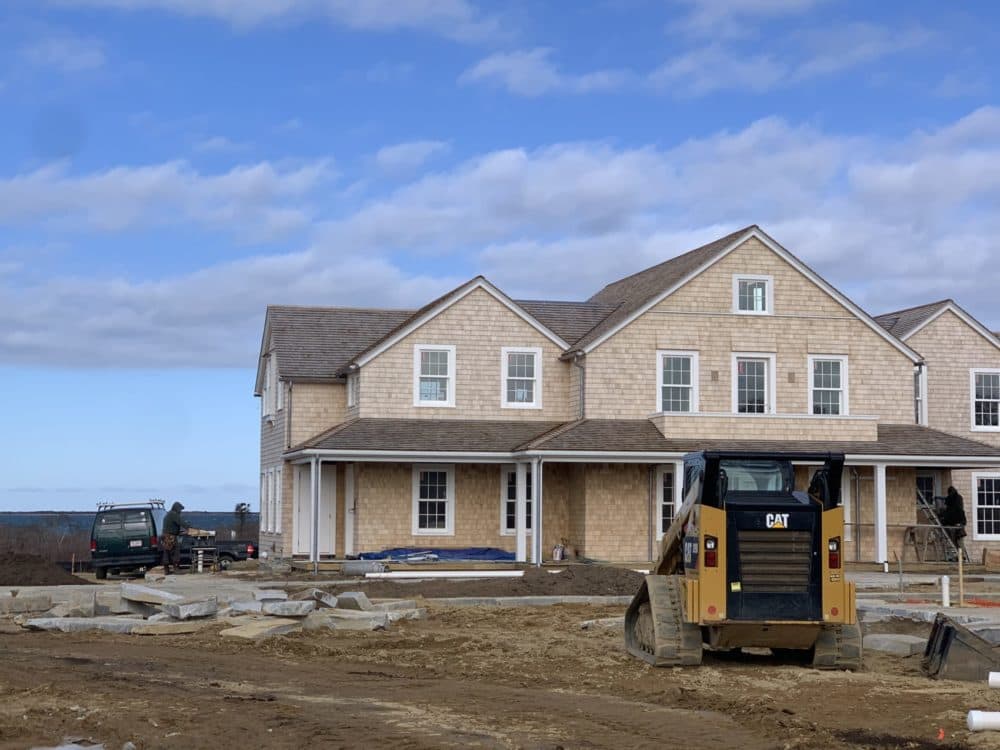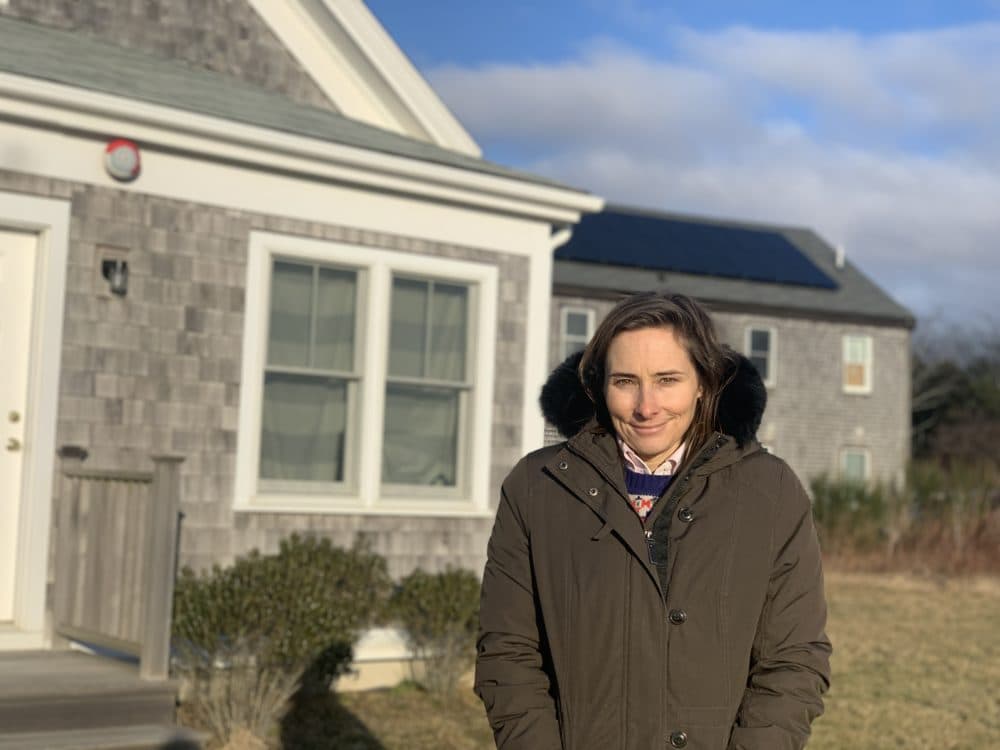Advertisement
Real Estate Fee Pitched As Solution To Nantucket Housing Crisis

Carpenter Samuel Tejada has lived on Nantucket since 2013 and says he’s committed to staying, despite the extreme cost of rent.
“For my apartment, it’s $5,500 a month,” he says in Spanish, the language of his native El Salvador.
That $5,500 pays for one side of a duplex where Tejada lives with his wife and son, and a roommate who helps with rent. Housing advocates say that’s high but not unheard of, especially for some immigrants on Nantucket.
As he takes a break from nailing shingles to the side of a palatial summer home overlooking Nantucket Sound, Tejada explains he's had to move every year since he arrived on the island off the coast of Massachusetts. It's something so common locals call it the “Nantucket Shuffle.”
The term refers to the way year-round residents often find housing during the off-season and are then forced to move once the warm weather starts attracting tens of thousands of visitors, tripling or even quadrupling Nantucket’s population and prompting landlords to ramp up the rent.
“[It’s hard] being in a situation where you don't know if you’ll have to move again next year," Tejada says, "and you don't know if the rent will go up another thousand dollars."
Tejada, who spends roughly 90% of his earnings on rent, dreams of one day buying a house. But on an island where town officials estimate the median sale price for a home is $1.75 million, that's close to unfathomable for someone who makes a living swinging a hammer.
“If we could [buy], of course, of course – that would be wonderful,” Tejada says, adding he’d want to help house others in the same situation he’s in now.

Affordable housing has long been a problem on Nantucket — the most expensive place to buy a home in Massachusetts, according to real estate website Zillow.com. Part of the reason is scarcity — according to the Census Bureau, nearly 7 in 10 homes on the island are considered vacant, mainly because they’re vacation homes.
The lack of affordable housing has forced employers to add housing to the cost of doing business. Some of the biggest employers own apartments used to house workers. Nantucket's hospital provides housing for 50 doctors, nurses and other healthcare workers, and is building 83 new units.
Driving between job sites, construction project manager Mark Avery says his company, Thirty Acre Wood, owns a dozen units to house workers and supervisors. Still, he says the lack of housing is making it harder to find craftspeople who live on the island.
"This is our lumber yard and our hardware store,” Avery says, pointing out the window of his truck. "Much of the staff of that store is flown in every day from Cape Cod, as is a lot of the workforce here. We just don't have enough people here left to do all the work that's required."
Advertisement
Advocates See New Hope For Affordable Housing
More than 200 below-market rental units are now in the works on Nantucket, but housing officials say it's not enough. That's a big part of the reason many Nantucketers are now rallying behind a plan to raise millions of new dollars to create both rental and owner-occupied housing.
The idea is to set a 0.5% fee on property sales above $2 million, a policy often referred to as a real estate transfer fee. If the fee is enacted, the seller of a $3 million home, for example, would pay $5,000 for the town’s affordable housing trust.
The nonprofit Housing Nantucket, which spearheads many of the workforce housing initiatives on the island, is among the groups backing the fee. Executive Director Anne Kuszpa says over the last decade, she's seen a transformation in people's attitudes toward affordable housing.

"So there was that sentiment: ‘Not everybody who wants to live on Nantucket should be able to live on Nantucket,’ and ‘people can commute,’ " Kuszpa says. "Whereas now, it's family members and friends and employees that are affected by the housing crisis."
The shortage has forced advocates like Kuszpa to look for less than obvious solutions. Under her group's "house recycling" program, homes slated for demolition are moved to vacant plots where they are rented to working people.
The Chamber of Commerce and the Nantucket Civic League have teamed up with the town to launch Homeshare Nantucket, a website for homeowners to link with employers in need of housing.
"People want to fix this problem,” says David Martin, the chamber's president and CEO. He adds that the board and most of the chamber's members support the new fee on real estate sales as a way to generate housing funds.
“It hurts to lose a teacher. It hurts to lose a police officer," he says. "It hurts to lose executives from your hospital because they can't find year-round housing."
Town officials in Nantucket say the transfer fee would finance housing for roughly 100 families over five years. But they can't levy the fee without support from the state Legislature, and in past years, the issue has failed to move forward.
Advocates say there’s new hope this year, as a number of other communities — including Somerville, Brookline, Truro and Concord — also seek permission for similar fees.
Perhaps the biggest cause for hope on Nantucket is the fact that the largest city in the state is now on board. Boston Mayor Marty Walsh is hinging his five-year housing goals on the fee, which he says will raise hundreds of millions of dollars. The goal is "to create thousands of homes, all across our city, affordable to a range of incomes, from the most vulnerable to the middle class," Walsh said in his annual State of the City address in January.
All of these efforts are contingent on action from state lawmakers, and they face opposition from the real estate industry.
Real Estate Agents Say The Fee Could Worsen Affordability
With a growing number of communities calling for real estate transfer fees, groups like the Greater Boston Real Estate Board and the Massachusetts Association of Realtors argue the fees could actually make the housing affordability problem worse.
Nantucket real estate agent David Callahan says the solution to the housing shortage should not increase the cost of housing. The fee could have unintended consequences, he says, even if it is exclusive to multimillion-dollar properties.
“It’s a tax,” Callahan says, sitting in his office in downtown Nantucket. “You can't deduct it. You can’t roll into your mortgage. Can't do any of that. So even though the seller is paying the fee, it's the buyer that's bringing the money to the table.”
Another broker fighting the transfer fee, Cape Cod-based Richard Waystack, says the issue is more complicated than it seems.
"It looks very easy and simple to attach [revenue for affordable housing] to housing, but it is not an overall fair tax policy,” says Waystack, president of the Residential Real Estate Council — a nonprofit that provides education for brokers. “Affordable housing benefits the entire community, and it should be the responsibility of the entire community, not just a select few."
Back on Nantucket, carpenter Samuel Tejada says life on the island reminds him of his former home in El Salvador, with chickens roaming the yards, dirt roads and plenty of time for family. That's why he's willing to spend so much of his income to stay here.
"I don't see any place to live other than Nantucket," he says.
This segment aired on February 21, 2020.
